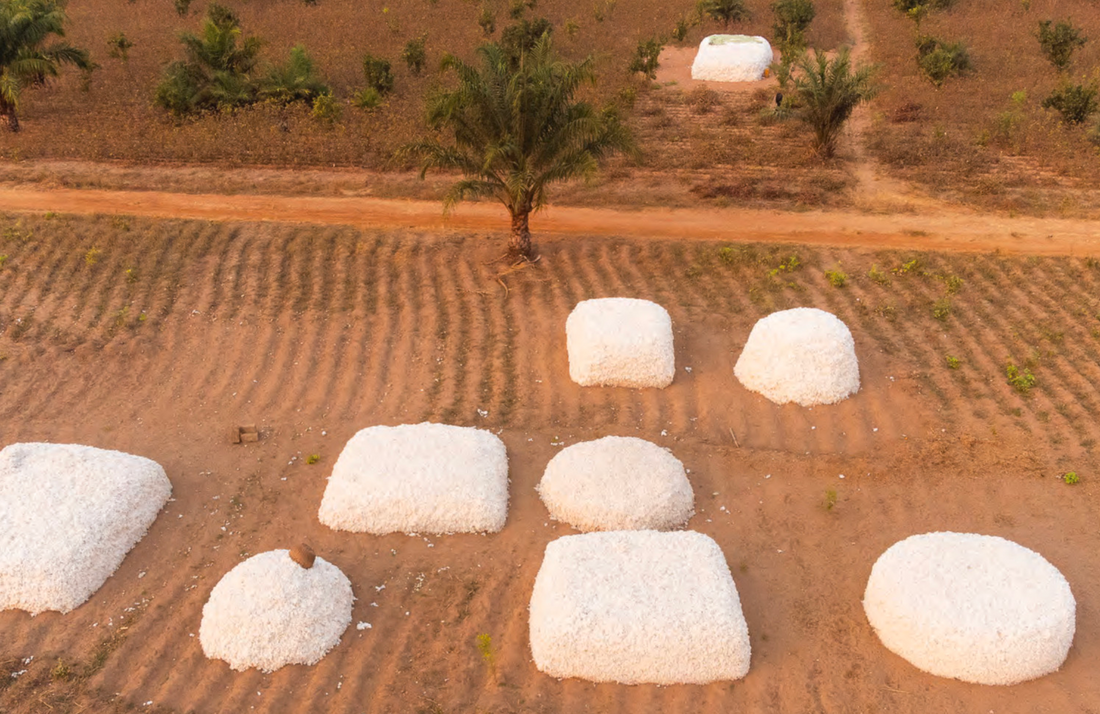
WARDROBE REVOLUTION WEEKEND: THIERRY OUSSOU
This week our blog will focus on our upcoming conference, Wardrobe Revolution Weekend. An online event, hosted on Zoom, we are bringing together twenty speakers to present their present their response to the Crisis in our Wardrobes.
We like to introduce you to Thierry Oussou who, although usually a painter, has turned his attention to cotton. Oussou is currently developing an on-going research which observes the lives of Beninese men and women working in the cotton plantations in Benin. In his recent practice, he shows great interest in professions that are marginalised and overlooked. From cotton workers to public transport drivers, his visual investigation aims to emphasise, or rather turn visible the different terms of labour that exist, and how they affect the society we live in.
Cotton on is an excerpt from Selvedge issue 114: Regeneration
Equilibrium Wind shines a light on the value of manual labour worldwide. It’s the brainchild of conceptual artist Thierry Oussou, who was born in Allada, southern Benin, and grew up in Cotonou. No stranger to the dignity of manual labour, he vividly recalls, while visiting his relatives’ pineapple farm, how fresh pineapples tightly packed for transport were an odd, sombre reminder of captives once crammed on slave ships.
After a residency at the Rijksakademie in Amsterdam in 2015-16, he was inspired to translate commodities into conceptual art installations. Reflecting on his feelings toward slavery and the ripple effects of globalisation, he chose cotton with its long history and role in the modern global economy. Equilibrium Wind started in 2018 with Oussou’s purchase of four hectares of land in Panouignan District, central Benin, where he established his cotton plantation, quietly becoming an agricultural producer. Based in Amsterdam and a newcomer to the cotton sector, he initially kept his artistic intentions private.
He was curious whether fellow farmers would understand the plan to keep the crops for art installations, since cotton was typically a cash crop cultivated for sale. Oussou has since learned the nuts and bolts of managing a plantation with the help of a team of 20, mostly elders, working the fields during the cotton season from June to December. Oussou’s outsider status allowed him to adjust working conditions to his singular expectations. Granting above-average wages to fieldhands was a top priority, as he knew picking cotton without machinery was labour intensive, especially for the elderly. “It’s intriguing and captivating to watch cotton pickers at work, knowing the fibre will be processed into yarn, then clothing for fashion trends unknown to West African labourers,” he says. “As a Beninese artist, I must address the economic growth of this country, which is dependent on agricultural products. I focus on capturing the movements of physical labour as I see them in the fields and create a series of works that can witness our time and can honour labourers worldwide.” Cotton is planted in June and then picked by hand during the whole month of December. The cotton is grown exclusively in rainfed conditions. Oussou has been adjusting conventional cultivation techniques to his needs, cutting inputs in half and observing their impact on the yields. In the wake of his recent formative experience in Japan, he feels it’s time to try organic farming. The first experimental crop (2019-20) yielded 3.3 tons of cotton, which was promptly sold to ginning mills; the profits were reinvested into the plantation.
Production decreased to one ton during the pandemic, as lockdowns prevented the artist from travelling to Africa. He stayed in Benin for most of the 2021-22 cotton season and was rewarded with five tons of cotton that he was allowed to store away, upon receiving an invitation to Japan’s Aichi Triennale 2022. Yet he soon discovered that unginned cotton was prohibited from travel. “Ginning is the biggest issue for an artist doubling as a cotton.
Text by Anne Laure Camilleri.
At the Wardrobe Revolution Weekend, Oussou will discuss his work with cotton plantations in Benin and his own production of cotton.
Wardrobe Revolution Weekend will be held on Saturday 4 November 2023. An online event hosted on Zoom. The event will be recorded.
Book your ticket and be part of the conversation:
www.selvedge.org/products/wardrobe-revolution-weekend
We like to introduce you to Thierry Oussou who, although usually a painter, has turned his attention to cotton. Oussou is currently developing an on-going research which observes the lives of Beninese men and women working in the cotton plantations in Benin. In his recent practice, he shows great interest in professions that are marginalised and overlooked. From cotton workers to public transport drivers, his visual investigation aims to emphasise, or rather turn visible the different terms of labour that exist, and how they affect the society we live in.
Cotton on is an excerpt from Selvedge issue 114: Regeneration
Equilibrium Wind shines a light on the value of manual labour worldwide. It’s the brainchild of conceptual artist Thierry Oussou, who was born in Allada, southern Benin, and grew up in Cotonou. No stranger to the dignity of manual labour, he vividly recalls, while visiting his relatives’ pineapple farm, how fresh pineapples tightly packed for transport were an odd, sombre reminder of captives once crammed on slave ships.
After a residency at the Rijksakademie in Amsterdam in 2015-16, he was inspired to translate commodities into conceptual art installations. Reflecting on his feelings toward slavery and the ripple effects of globalisation, he chose cotton with its long history and role in the modern global economy. Equilibrium Wind started in 2018 with Oussou’s purchase of four hectares of land in Panouignan District, central Benin, where he established his cotton plantation, quietly becoming an agricultural producer. Based in Amsterdam and a newcomer to the cotton sector, he initially kept his artistic intentions private.
He was curious whether fellow farmers would understand the plan to keep the crops for art installations, since cotton was typically a cash crop cultivated for sale. Oussou has since learned the nuts and bolts of managing a plantation with the help of a team of 20, mostly elders, working the fields during the cotton season from June to December. Oussou’s outsider status allowed him to adjust working conditions to his singular expectations. Granting above-average wages to fieldhands was a top priority, as he knew picking cotton without machinery was labour intensive, especially for the elderly. “It’s intriguing and captivating to watch cotton pickers at work, knowing the fibre will be processed into yarn, then clothing for fashion trends unknown to West African labourers,” he says. “As a Beninese artist, I must address the economic growth of this country, which is dependent on agricultural products. I focus on capturing the movements of physical labour as I see them in the fields and create a series of works that can witness our time and can honour labourers worldwide.” Cotton is planted in June and then picked by hand during the whole month of December. The cotton is grown exclusively in rainfed conditions. Oussou has been adjusting conventional cultivation techniques to his needs, cutting inputs in half and observing their impact on the yields. In the wake of his recent formative experience in Japan, he feels it’s time to try organic farming. The first experimental crop (2019-20) yielded 3.3 tons of cotton, which was promptly sold to ginning mills; the profits were reinvested into the plantation.
Production decreased to one ton during the pandemic, as lockdowns prevented the artist from travelling to Africa. He stayed in Benin for most of the 2021-22 cotton season and was rewarded with five tons of cotton that he was allowed to store away, upon receiving an invitation to Japan’s Aichi Triennale 2022. Yet he soon discovered that unginned cotton was prohibited from travel. “Ginning is the biggest issue for an artist doubling as a cotton.
Text by Anne Laure Camilleri.
At the Wardrobe Revolution Weekend, Oussou will discuss his work with cotton plantations in Benin and his own production of cotton.
Wardrobe Revolution Weekend will be held on Saturday 4 November 2023. An online event hosted on Zoom. The event will be recorded.
Book your ticket and be part of the conversation:
www.selvedge.org/products/wardrobe-revolution-weekend
